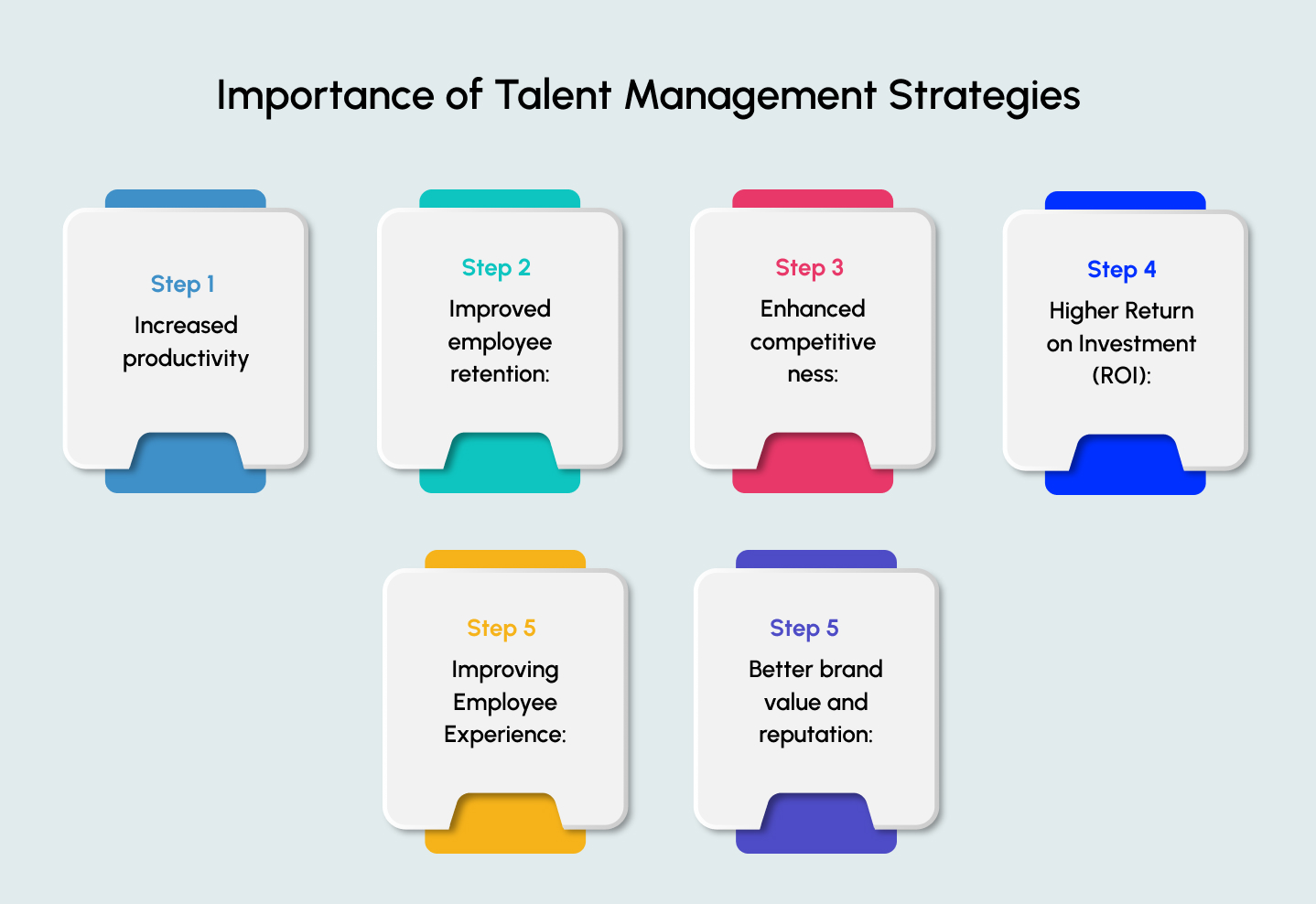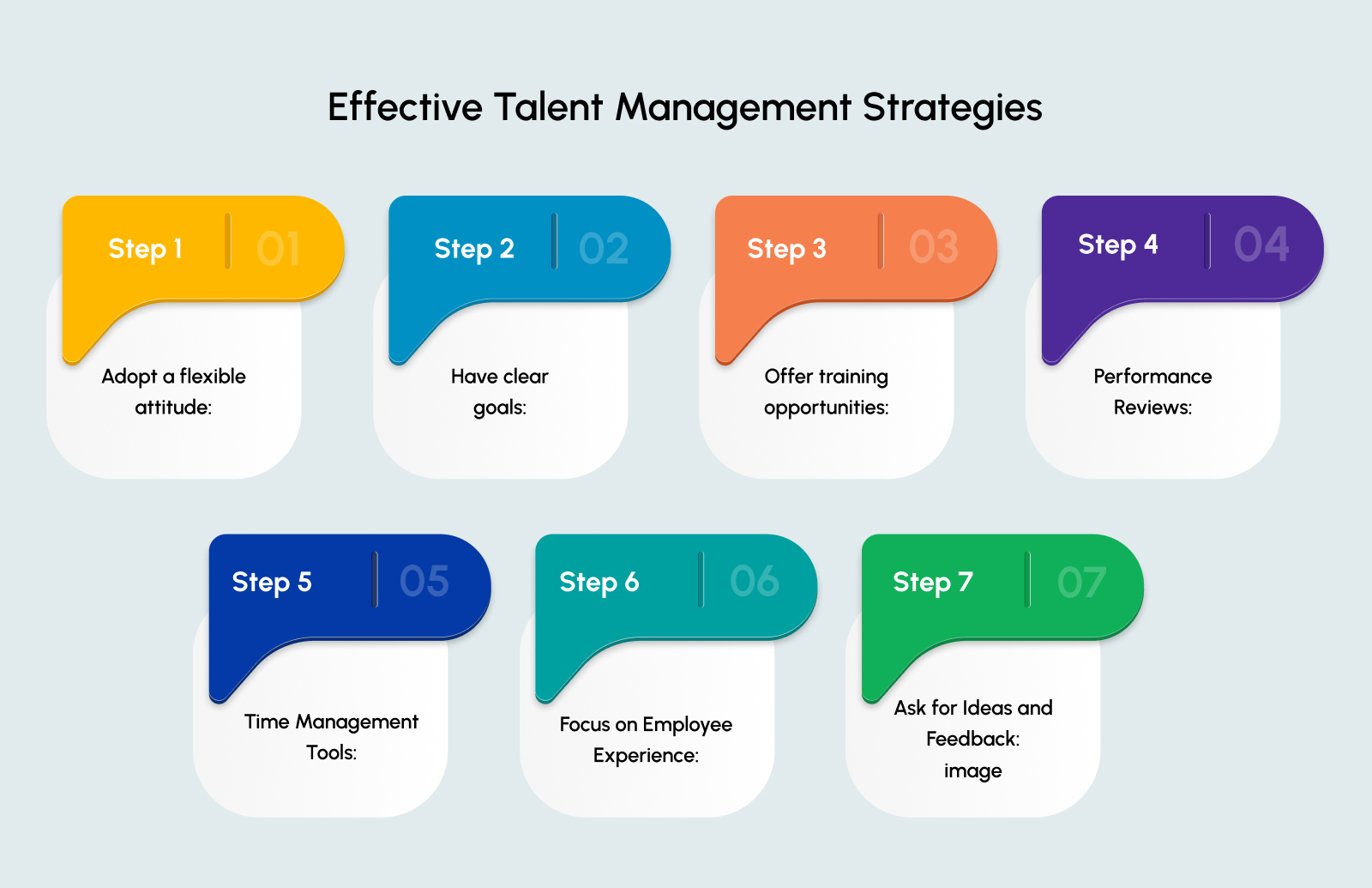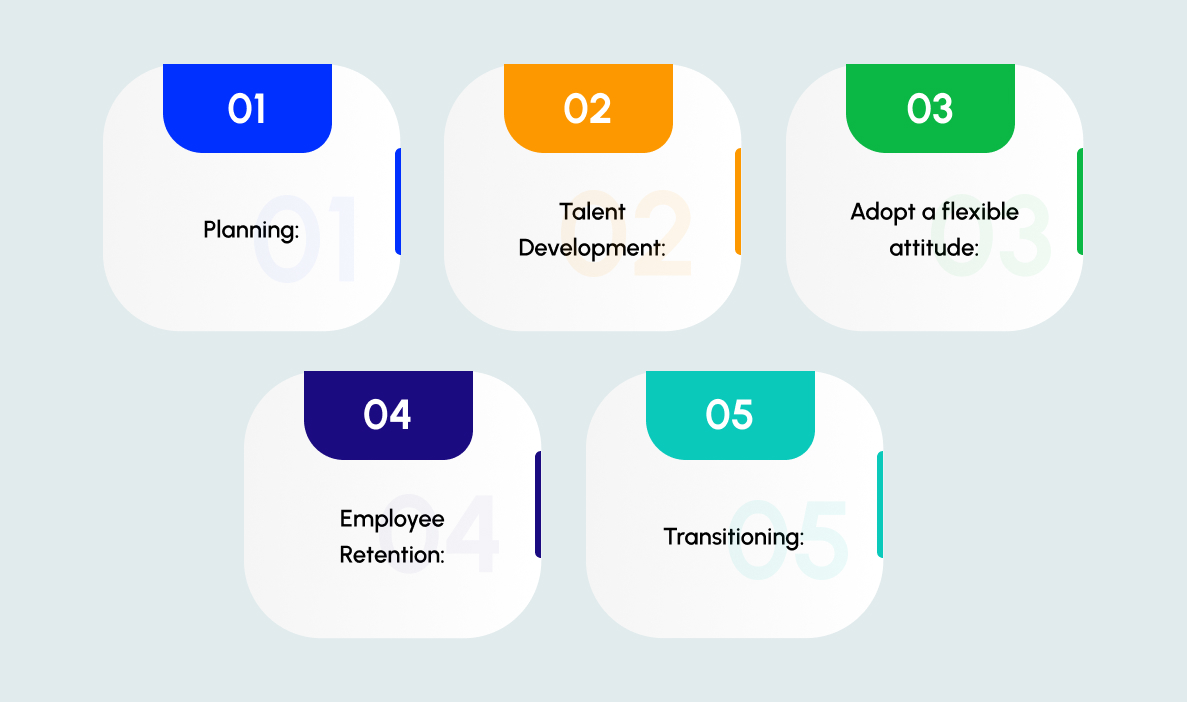- May 31, 2023
- Talent Management
- 3485
Share this post on:

In 2023, business leaders are facing numerous unpredictable challenges, including a competitive talent landscape, burn-out, quiet-quitting, great resignation, and more. All these challenges have made it necessary for businesses to opt for talent management strategies.
A study shows that there are very few companies that have talent strategies. Moreover, of all the companies having marketing strategies, only 31% have strategies aligned with their business goals.
We live in an age where employees are constantly looking for better opportunities. Not that businesses are looking for better employees. So, to thrive in this highly-competitive market, businesses must follow talent management strategies. By doing so, they can attract, develop, and retain talented employees that help them stand out.
Talent management strategies involve the techniques and processes that help businesses discover, retain, and engage high-potential and outstanding candidates. The talent management process must align with the organization’s goal and ensure that the candidate’s skills, experience, and knowledge contribute to its success.
Importance of Talent Management Strategies
Effective talent management strategies can help companies achieve several important objectives. This includes building a strong pipeline of leaders for the future, improving organizational performance, increasing employee loyalty and commitment, reducing turnover rates, and promoting diversity.
Here are some benefits associated with proper talent management strategies:

- Increased productivity: An appropriate talent management strategy can enhance the team's productivity. It ensures that they have the right person in the role and provides them with training and development opportunities.
- Improved employee retention: By investing time and resources into talent planning, organizations can improve job satisfaction and reduce turnover rates.
- Enhanced competitiveness: Well-managed talent management strategies allow companies to stay ahead of the competition by having access to skilled employees. These employees are well-versed and are capable of understanding and adapting to changes quickly and responding promptly as market conditions evolve.
- Higher Return on Investment (ROI): Effective plan offers employees great opportunities to grow in a company. Hence they are less likely to leave the company. This leads to increased ROIs and better decision-making processes.
- Improving Employee Experience: People want to feel accepted and seen where they work. Every employee wants to get recognized for their contribution. Better strategies help employees to grow and hence improve their experience.
- Better brand value and reputation: Companies that show concern for their workers and actively seek ways to develop the talent pipeline both within and outside their organizations tend to be perceived more positively among customers. This enhances your brand’s value and reputation.
What are the Effective Talent Management Strategies?
With the enhancement of competition in the business market, effective talent management has become more crucial than ever before. Organizations need to adapt quickly to changing market conditions.
To achieve this, it becomes essential to have talented employees who can think critically, innovate, and solve problems effectively. Here are some effective talent management strategies that organizations should adopt:

- Adopt a flexible attitude: With the evolution of technology, workplaces are evolving too. These days, remote work is becoming a standard across various industries. Even though it has enhanced work-life balance for the employees, it has given rise to numerous challenges for the managers. Leaders are opting for different management styles, but it has their disadvantages. As it has enhanced the team management challenges in front of the leaders.
So the managers must opt for a flexible schedule instead of sticking to the 9-to-5 routine.
If you are managing a team that cannot have flexible schedules, you can opt for other talent management strategies. For instance, if you are running a restaurant business or a business that runs 24*7, you can opt for rotating shifts for the employees.
- Have clear goals: Ensure that each employee has clarity about their work and knows their deadlines. A manager must make every employee clear about their roles and objectives so they do not get confused and demotivated. Ensure that your employees are aware of long-term and short-term goals. Moreover, managers can use the SMART approach while informing their employees about their objectives.
This approach allows managers to set specific and measurable objectives. For example, if you are a manager and are working with the writers of your company, you can instruct them on how many blogs they need to write in a day so that you can achieve your monthly goal.
- Offer training opportunities: Every employee wants to work with a company that offers them growth opportunities. No one wants to work with the same skills and position in the long run. So companies must invest in their employee's career development.
A report by LinkedIn Learning says that 94% of employees stated that they only stay in a company as long as their company invests in their career.
There are two ways by which businesses can invest in their employees' careers: Developing in-house training programs or sponsoring them for external learning.
Most companies prefer training programs online as it is easy for employees to learn at their own pace. But, some companies develop in-house training programs and offer employees resources to learn and enhance their skills.
- Performance Reviews: Managers are allowed to give feedback to their employees. Companies can take employee performance as an opportunity to recognize and reward them for their effort. Performance reviews are one of the most fruitful methods to retain and keep employees motivated.
A customized performance management system is one of the most efficient talent management strategies. It is used to retain talent, but it is hard to know which specific model can boost the retention rate of your employees. Moreover, companies are free to redesign their management strategies anytime they want.
- Time Management Tools: Time management tools help businesses boost the productivity and focus of the team. These tools help employees make plans, strategies and organize their work properly.
There are tools available in the market, and each has different prices. Moreover, the price of tools depends on their feasibility, robustness, scalability, and additional features. So, it is vital to make a list of the best management tools and take their demo before buying or using them.
- Focus on Employee Experience: Talent management strategies must be in a way that offers a complete and great experience to the employees. It includes balanced working hours, employee benefits, and the company’s work culture. This can be achieved by creating a healthy company culture that keeps employees motivated and focused. Moreover, ensure that the communication channel is transparent to avoid any kind of miscommunication.
Furthermore, you can opt for Buffer’s Mastermind Program to create better employee relationships. But this is not enough businesses must ensure to offer great opportunities and benefits to win them.
- Ask for Ideas and Feedback: Managers must appreciate their employees' ideas and creativity. None of the strategies is effective until or unless you know how employees work. The feedback helps management determine what the employees are looking for, struggling with, or how they are performing. So ensure that you get constant feedback from managers to effectively handle any challenges.
What is a Talent Management Model?
The talent management model describes all the various functions and processes that develop your talent management strategy.
There are numerous different ways to design a talent management strategy. But it is crucial to develop strategies to match your business objectives. However, every talent management model must cover the following vital aspects:

- Planning: Planning is a crucial aspect of any successful talent management program. By taking a structured approach to talent planning, an organization can set itself apart from competitors and attract, develop, and retain top-performing employees who drive business success.
Effective talent planning provides direction, clarity, and consistency to attract, groom, engage, transform, and retain teams. Moreover, talent planning is about mapping out present and future talent needs to help ensure your company has access to skilled employees.
- Talent Development: Talent development refers to the processes, tools, and initiatives used to cultivate the skills, knowledge, and capabilities of individuals who work within an organization.
The purpose of talent development is to maximize the contribution of these workers to business objectives and facilitate their growth, ultimately improving organizational outcomes. This may include personalized professional development initiatives, such as mentoring or coaching programs, regular performance reviews, training and development plans, access to educational resources, and flexible learning solutions. These efforts can help ensure that current and prospective employees develop critical technical abilities.
- Attracting Employees: Attracting refers to the efforts made by an organization to draw potential candidates to apply and join the company. Attracting talent involves creating a positive image of the organization that appeals to job seekers and showcases why they should want to be part of it.
Successfully attracting talent requires creating an image that goes well with individuals and convinces them why their organization is a good place for them to grow. Organizations might focus their recruitment efforts on LinkedIn or social media promotions. This helps effectively attract new employees.
- Employee Retention: Retaining means holding onto and maintaining skilled employees within a company. It includes providing training, compensation, benefits, and working conditions to ensure that employees want to stay with the organization long-term. The goal is to create an environment that encourages top talent to remain loyal to the company and continue contributing to its success.
To accomplish this, HR professionals use a variety of techniques, such as developing effective onboarding programs, ensuring competitive pay and benefits packages, and fostering open communication and collaboration.
Successful retention helps companies reduce hiring costs, reduce the risk of losing business secrets and valuable intellectual property, improve public image, and achieve more efficient operations due to less downtime for training and recruitment.
- Transitioning: Talent transitioning typically occurs towards the end of the employee life cycle, when an employee moves from one role to another within the same organization. Organizations should develop clear transition action plans, targeted learning goals, and mentorship opportunities during the first half year of tenure in a key position.
Effective transitions require constant focus and feedback loops for senior leaders responsible for helping groom new senior executives. A good transition also comprises having clarity around objectives, outcomes, and expectations.
Lastly, efficiency is improved by streamlining the execution level, thereby removing communications gaps.
Summary:
The numerous opportunities present in the market have made it challenging for businesses to retain employees and keep them committed to work. Thereby, it has become crucial for companies to develop talent strategies to retain their best employees.
Are you looking for a reliable, secure, and seamless Talent Management System for your business? We offer unique, comprehensive, and intuitive solutions for talent management, which help talent managers to manage recruitment more effectively.










